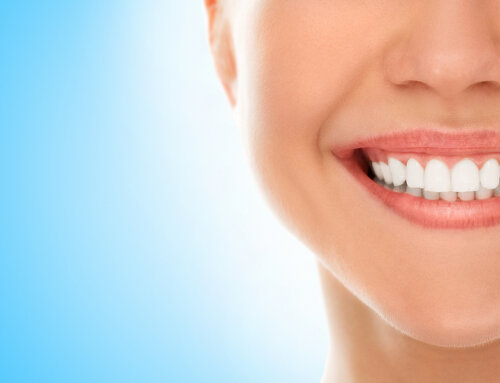Tooth and gum problems (gingivitis: red, swollen and bleeding gums which do not affect the bone; periodontitis: inflammation around the tooth which causes bone loss and can elevate blood sugars) are more common in people with diabetes – especially when blood sugars are uncontrolled. High blood sugars prevent the white blood cells from fighting infection and increase the risk of oral infections.
Gum disease is two times more common in people with diabetes. Other risk factors for gum disease include smoking, family history, genetics, hormone changes and poor mouth care. The good news is with reasonable attention to your mouth you can help avoid problems. It is well known that your mouth can affect your entire health as well as be a window to your overall health. Dentists may now be able to help identify cardiac disease, diabetes, and cancer by simply doing a complete mouth check up. When your mouth is cared for properly you can eat, smile, talk and laugh without difficulty. Keep your scheduled dental appointments and decide with your dental professional how many times you should visit per year. Some people can get by with a one time a year visit while others are plaque producers which may require up to four visits a year. Always discuss your mouth care choices with your dentist, dental hygienist or periodontist. Let’s examine some simple daily techniques to ensure proper mouth care and keep you happy for a lifetime.
- Most people brush their teeth without thinking about timing or good technique. The reason to brush is to dislodge the plaque that increases around the gum line. Brushing your teeth is important, but brushing at the gum line and on the gums is the best technique according to the American Dental Association. Plaque can cause infections that hurt the gums and bones that support the teeth. When plaque is not removed it can form tartar which must be removed by a professional.
- The brushing process should take about 2 full minutes when done correctly. Some electric toothbrushes have timers built in but you can use a simple kitchen timer at first, just to see how long 2 minutes really is. Each quadrant of your mouth should take 30 seconds.
- The tooth brush should be held at an angle of 45 degrees instead of flat against your teeth. Pay close attention to the back molars and wisdom teeth both inner and outer surfaces.
- The brush should move in short strokes covering the entire tooth surface, the gum line and the actual gum.
- Stick to a soft bristle since harder/stiffer bristles do not remove more plaque and can irritate the tissue. The hard bristles can lead to enamel loss which is the hard protective surface that surrounds the tooth. Research shows that gargling with plain water after you have drinks including alcohol, citrus, and coffee which can make the teeth more porous is better then brushing. Brushing twice a day should be sufficient. Do not eat after you brush.
- Even tooth brush head size can make a difference. If you have a small mouth do not pick a large toothbrush; if you have a large mouth do not pick a child size tooth brush. Change your tooth brush every 3-4 months since the bristles do wear out. Throw out your toothbrush after a cold, flu or respiratory sickness. Rinse your tooth brush with hot water every few days.
- If you can afford an electric tooth brush, invest in one since the vibrating can do part of the work. An electric toothbrush is excellent for anyone who has dexterity problems including arthritis or Carpel Tunnel. Even using the less expensive ones ($5.99) can do a great job.
- Include scraping your tongue with a tongue scraper or just brushing your tongue. The tongue has bacteria especially near the back end which also contributes to gum disease.
- Flossing is one of the most important parts of mouth care. This helps break up the plaque and trapped foods. If you are not sure how to floss it is worth your time to check with a dental professional. For close teeth use a waxed floss which will make it easier. You can use special pick devices as well but try not to use wood tooth picks which can splinter and irritate.
- Mouth rinses may be helpful. Some rinses can freshen your breath while treatment rinses strengthen the enamel and fight decay. Many dentists still recommend a rinse like Listerine but it is a personal preference; again check with your dentist. Tooth pastes should be individualized as well. The brushing technique matters more than the actual products. Watch for rinses which contain alcohol since this can cause dry mouth and irritation.
- Talk to your dentist to see if you are a tooth grinder. They can check the teeth to see if they are worn down or flat. Grinding can cause headaches, sore muscles in the mouth, and neck or jaw aches. Many times grinding comes from stress so work on stress management options like exercise, deep breathing or meditation. Your dentist can create a mouth guard or bite plate to protect the teeth if needed; grinding can shift the teeth and bite if not dealt with.
- People with diabetes may have dry mouth due to elevated blood sugars, kidney disease or from certain medications. Using products from the Biotene line (gum, mints, rinse or toothpaste) can help. Taking small sips of water, chewing sugar free gum (Xylitol, the sugar free alcohol in gum, can’t be metabolized by bacteria so it stops the growth) or sucking on sugar free mints or hard candies can be beneficial. Watch the total amount, since they may increase stomach bloating and digestive issues.
- Consider taking probiotics. They are the friendly bacteria which occur in foods like yogurt, kefir or fermented foods; these foods are known to aid with gut health. Recent research suggests taking oral probiotics may be helpful to mouth health in the same way. Talk to your dentist about ProBiora3 or Prodentis and see if these products could be beneficial.
Good oral care is well worth all the benefits that can be seen especially when you have diabetes. Studies have shown that mouth care can reduce medical bills of people who have diabetes over $2000.00 a year. Take the time along with your dental professional to keep your mouth clean and smiling!
NOTE: Consult your doctor first to make sure my recommendations fit your special health needs.













Leave A Comment